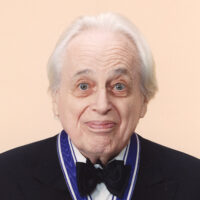
2001 Kyoto Prize Laureates
Music
/ Composer
1923 - 2006
Between Science, Music and Politics
2001
11 /11 Sun
Place:Kyoto International Conference Center
Ligeti in Kyoto
2001
11 /12 Mon
13:20 - 17:30
Place:Kyoto International Conference Hall
Mr. Ligeti is a master of modern music who saw through the limitations of serialism, which was the mainstream avant-garde music after World War II. While building on the achievements of the serialists, he has established his own unique musical style that fascinates people with its rich sound and fullness of human feeling.
Mr. György Ligeti is a master of modern music who saw through the limitations of serialism, the mainstream avant – garde school of music after World War II. Building on the achievements of the serialists, he established his own unique musical style.
Mr. Ligeti made it to the international stage after the Hungarian uprising forced him to flee to Austria in 1956. Having previously known only a closed political regime, he was greatly surprised by the movements he saw in Western Europe. He was also thrown into contact with the avant – garde music of his generation, which helped him to establish his own personal style and mode of expression. The unique “tone cluster” method he first used in his composition “Apparitions” (1959) brought a fresh breeze to European music circles even as it exerted a profound impact on them. That masterpiece was followed by “Atmospheres,” which was first performed at the ISCM Festival in Donaueschingen, where it earned an honored place in the annals of contemporary music. In “Atmospheres,” Mr. Ligeti applied the most precise, complicated movement to each individual note of every grouping. This technique, “Micropolyphony” as he himself dubbed it, creates a great mass of sound that leaves in the listener an overall sensation of the color variation created by the movement of the carefully annotated individual notes, rather than a clearly outlined shape.
During the 1960s, Mr. Ligeti achieved indisputable fame as one of the most prominent composers in contemporary music, creating such works as “Aventures” (1962), a dramatic piece for three voices and seven instruments, and “Lontano” (1967), which highlights the composer’s singular lyricism.
Between 1974 and 1977, Mr. Ligeti applied his unique, highly individual techniques to the composition of an opera. The resulting “Le Grand Macabre” was hailed as the most significant opera of the latter half of the 20th century in pointing towards new operatic directions. The 1980s saw the creative background to Mr. Ligeti’s work assume even broader dimensions. Some of his work took on a more distinctively Hungarian color, and other pieces revealed his strong interest in African and other non – European music, or the influence of concepts such as fractals (a branch of mathematics concerned with a property called self – similarity, irregular patterns made up of parts that are in some way similar to the whole). Along with his unique interpretations of polyrhythm and automatism, his creativity has spawned a number of other fruits.
Whether by way of serialism, aleatory music, or some other modern musical technique or style, Mr. Ligeti has striven to transcend all limitations and restrictions in search of creative possibilities, and continues his vital activities with a consistently strong devotion, while maintaining both his originality and his spirit of sharp criticism for the harsh political circumstances he has experienced. In this manner, Mr. Ligeti has enchanted people the world over with his humane, rich sound.
For these reasons, the Inamori Foundation is pleased to bestow upon Mr. György Ligeti the 2001 Kyoto Prize in Arts and Philosophy.
Profile is at the time of the award.